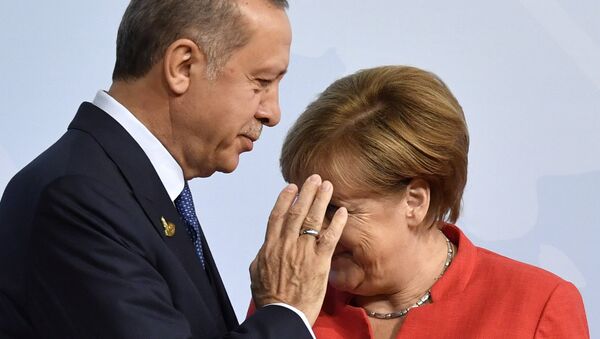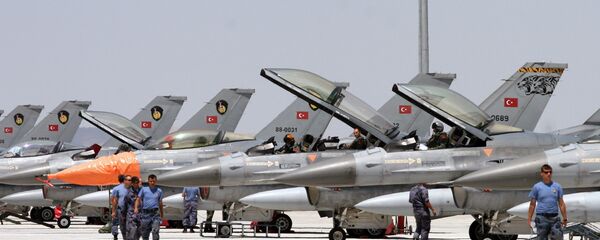The situation between both nations worsened after Germany banned Ankara from holding pre-referendum rallies on German soil.
The relations between Turkey and Germany severely deteriorated after Turkey detained German human rights activist Peter Steudtner and five other activists, including Amnesty International's Turkey director, Idil Eser, on July 5 on allegations of aiding a terrorist group. Last Tuesday, a Turkish court ruled to keep the activists in custody.
In a recent twist of the conflict, Turkey banned German lawmakers from visiting German personnel at the NATO military base in Konya. The German Foreign Ministry had informed a group of lawmakers that their visit to Konya base, initially scheduled for July 17, was banned by Ankara. German government spokesman Steffen Seibert later explained that the visit was not canceled, but postponed to a later date. However, no information on the rescheduled visit was provided.
Last Wednesday, Turkey blacklisted a total of 681 German enterprises and individuals over their alleged support of terrorism. Specifically, they are suspected of backing Turkish Islamic cleric Fethullah Gulen, who stands accused by Ankara of staging the failed coup in 2016. Turkey has reportedly given the list to Germany's Federal Criminal Police Office.
On Thursday, German Economy Minister Brigitte Zypries said Berlin would protect German firms working in Turkey from "completely unjustified and incomprehensible accusations." Erdogan condemned the statement of Zypries as aimed at "scaring investors" from Turkey.
German Foreign Minister Sigmar Gabriel promised to review Berlin's policy toward Ankara, including the economic policy, and credit and investment programs. The German government also decided to freeze arms projects with Turkey.
"Moscow might become the major winner in this standoff: while Turkey and Germany are tackling their tactical tasks, Russia, thanks to the conflict, is solving its strategic goals. The deterioration of Turkish-German relations (because of the referendum and those arrested), especially against the deteriorated Turkish-American relations (because of the Kurds), puts Ankara on the brink of international isolation, where Moscow is going to be its only window of opportunities," Mirzayan writes in his analytical article for RIA Novosti.
Moscow, unlike Turkey's western partners, does not interfere in Turkey's internal affairs, he further explains. Through Moscow, Turkey could have a dialogue with Iraqis, who also have no desire to mentor President Erdogan about liberal democracy and human rights. Therefore it is highly likely that Recep Tayyip Erdogan will respect Russia's interests and won't get in Russia's way in Syria, the political analyst suggests.
It is even of more importance now, when the Turkey-backed militants should behave quietly and not impede the Syrian forces' operations in Deir ez-Zor and when the Syrian diplomats are trying to make agreements with the Turkey-backed militants on terms of national reconciliation, he adds.
Besides, Gevorg Mirzayan suggests, the Turkish-German aggravation will help Moscow in its dialogue with Europe on the gas issue. Russian experts and public officials tried to convince Europeans that Turkish suggestions are very unreliable and that Turkey would use the gas transit as a political leverage. However neither Berlin nor Brussels have listened to them while being too obsessed by an idea of diversification. They did not adhere to Moscow and bet on "non-Russian" gas deliveries, for example, from the Caspian Sea via Turkey.
Now it is only too clear to Germans (not to Poles however) that Turkey has become very unreliable and something should be done about it. Someone in Europe might already be grudging that they had pushed the Bulgarians to kill the South Stream project.
"There is absolutely no way of returning to the initial project of the South Stream pipeline, even theoretically. First of all, the capacity of the project was 63 billion cubic meters per year. The current capacity of the gas pipeline network on Russia's territory, from the Yamal peninsula in Western Siberia to the Black Sea town of Anapa, is only 31.5 billion cubic meters. These correspond to the two strings of the pipeline, one of which will run to Turkey (delivering the gas volume the Turks receive by transit through Ukraine and Bulgaria). It means that Moscow will be able to deliver the only remaining 15.75 billion cubic meters through Bulgaria, and only under guarantees of non-interference from Brussels," Igor Yushkov, lead analyst at the National Energy Security Fund, explained to Gevorg Mirzayan.
The only solution, Mirzayan then says, is the Nord Stream 2 project, which Russia is constructing jointly with Germany. And if the conflict between Germany and Turkey is not going to die down, Germans will be even more interested in its success and will push it through Brussels, while turning a deaf ear to any political wailing of its Eastern European neighbors, he concluded.






